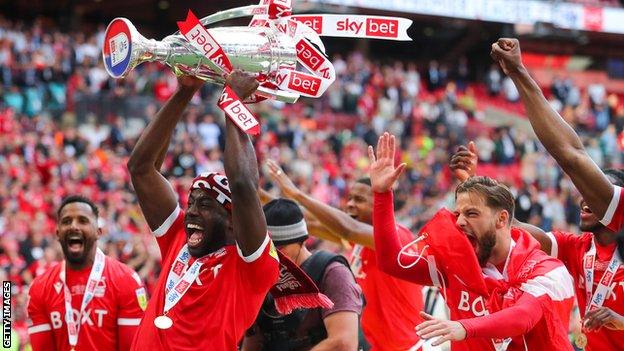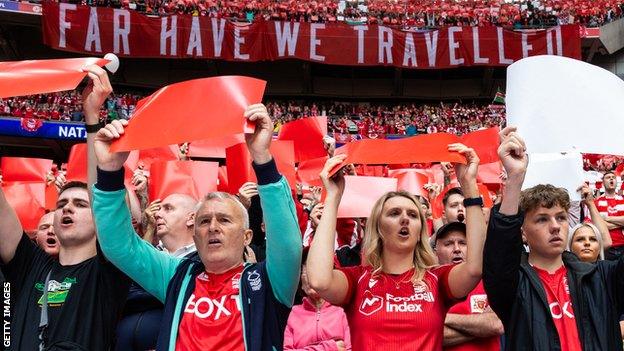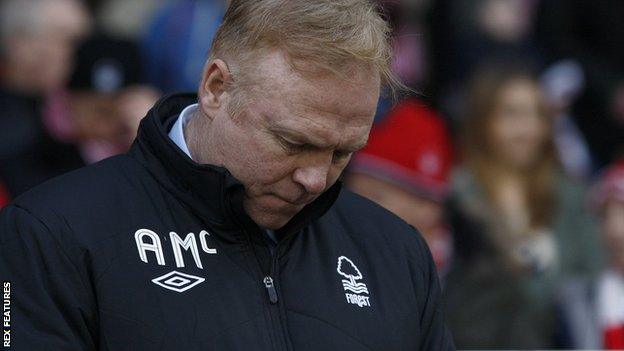Nottingham Forest: Charting the Reds' 23-year journey back to the Premier League
- Published

Nottingham Forest have not played in the Premier League since 1998-99
The longest ever wait for a Premier League return is over - Nottingham Forest are back.
It has been 23 years since top-flight football was last played on the banks of the River Trent.
Sunday's 1-0 Championship play-off final victory against Huddersfield Town to seal promotion at Wembley came 8,414 days since Forest's last Premier League game when relegated in 1999.
They have played 1,069 league and play-off games trying to get back.
Getting to those matches and and back has seen them clock up more than 100,000 miles - the equivalent of circumnavigating the globe more than four times.
Two banners were unfurled by fans just before kick off at Wembley, which read "far have we travelled" and "much have we seen".
A total of 20 different managers have been at the wheel on the long road back, with Steve Cooper the man to drive them all the way to English football's promised land.
Forest's Nottingham-born captain Joe Worrall is only too aware of the long journey the club has taken supporters on.
"Thank you," he said to the fans after Sunday's win. "You've followed us across the country for many years.
"It's been a tough football club at times, and all that has been repaid today. Forest are back in the Premier League."

Nottingham Forest sold out their allocation at Wembley
From yo-yo club to 23-year exile
Going back to last century, the notion that two-time European Cup winners Forest would spend the next two decades outside of the Premier League seemed impossible.
And it is not for what the club achieved under the great Brian Clough - the two continental triumphs, an English top-flight title and four League Cup successes - that had people of the time thinking relegation under Ron Atkinson was something Forest could quickly recover from.
Twice in the previous five years, they had come straight back up.
Frank Clark, who replaced Clough at the City Ground when relegation in 1993 brought an end to the legendary manager's career, got them back a year later. Twelve months after that they finished third in the Premier League and qualified for the Uefa Cup.
While another relegation followed in 1997, they sprung straight back as second division champions for the fateful 1998-99 season.
"What you had was a yo-yo club," said BBC Radio Nottingham's Colin Fray, who has been commentating on Forest matches for 31 years.
"When they got back into Europe you thought normal service had been resumed. But there was another blip after that. But again they bounced back, so when they were relegated in 1999 you felt they would do it again.
"So never would anybody have thought at that stage that it would it take another 23 years to get back."
League One 'wake-up call'
What followed was six seasons in the second tier, a play-off semi-final capitulation against Sheffield United in 2003, then "the shock" of 2005 when they became the first European Cup-winning club to drop to the third tier of a domestic league.
"For those who have always had the feeling that Forest is a Premier League club, just without the actual status, being relegated to League One was sort of a 'hang on, maybe they are not any more' moment," Fray said.
"To get relegated to the third tier and Forest find themselves playing in the Football League Trophy, or the LDV Vans Trophy as it was known, and losing midweek away to Woking 3-2, was just unbelievable.
"There have been so many lows over the years, but relegation to League One and the dawning realisation that you would be playing in that cup after climbing to the pinnacle of European football for two years in a row was a wake-up call."
Allow X content?
This article contains content provided by X. We ask for your permission before anything is loaded, as they may be using cookies and other technologies. You may want to read X’s cookie policy, external and privacy policy, external before accepting. To view this content choose ‘accept and continue’.
A second season in League One turned into a third after Forest lost to Yeovil Town over two legs in the play-off semi-final, despite taking a two-goal lead into the home leg.
It was in the third division, however, that Fray feels Forest found much-needed stability under then chairman and owner Nigel Doughty - who had bought the club for £11m in 1999, saving them from administration - and manager Colin Calderwood.
"You are not going to be right on the pitch unless you are right off the pitch as well," Fray said.
"For so many reasons and for so many years something was wrong at Forest.
"The most stable bit of structure they had in the intervening period, until now, was in that time coming back out of League One, when they had gone to the bottom and were starting to climb back up again.
"It's hard to pick out their period in League One as being anywhere near a successful period in the club's history, but they had the structure in place behind the scenes at that point to get the club back on its feet."
Calderwood lasted four months on their return to the Championship in 2008-09, with his sacking leading Billy Davies' first spell in charge at the City Ground.
The Scot guided the Reds to back-to-back play-off campaigns. Both ended at the semi-final stage - the first in 2010 was settled by a chaotic 4-3 win for Blackpool, external at the City Ground, while hopes were dashed 12 months later by Swansea.
A period of upheaval was to follow Davies' departure. The Reds would finish inside the top 10 just three times in the next 10 seasons.
Forest's 'spiral'
Former England manager Steve McClaren came in as the new boss in the summer of 2011, but lasted 112 days before he left with Forest just a point above the drop zone after 10 games.
Doughty stepped down as chairman after admitting he made a "very poor decision" in hiring the former Manchester United assistant manager.
Just four months later, Doughty passed away, aged 54, leaving the club in an urgent search for a new owner.
"Forest really spiralled then," Fray said.
By the summer, Kuwaiti businessman Fawaz Al Hasawi had bought Doughty's controlling stake in the East Midlands side.
Within two days, manager Steve Cotterill was relieved of his duties.
Sean O'Driscoll was next to be placed in charge and was backed with a number of high-profile signings - which included bringing Billy Sharp in on loan.
But just hours after leading Forest to a 4-2 win against Leeds at the City Ground that lifted the Reds to eighth place on Boxing Day in 2012, O'Driscoll was bizarrely sacked.
To Alex McLeish, Forest turned. He lasted just 40 days in the job.

Alex McLeish only managed Nottingham Forest for seven games
In his five years as club custodian, Al Hasawi went through eight managers - with Davies in a second spell and club legend Stuart Pearce all having a go on the managerial merry-go-round.
"At one stage during that frenetic period there were players signed by eight different managers in the dressing room," Fray said. "Piecing together a squad from that was almost impossible at that stage.
"Fawaz wanted Forest in the Premier League, he spent and spent way too much and got Forest into a transfer embargo for breaching FFP [spending] rules.
"Managers were later coming in, like Dougie Freedman, who couldn't do anything in the transfer market."
They were under embargo, relying on loan deals and free transfers, for 18 months.
'Forest can shake-up the Premier League'
In May 2017, just days after the Reds escaped relegation to League One on goal difference with a win on the final day of the season, Greek shipping magnate Evangelos Marinakis, owner of Olympiakos, bought the club from Al Hasawi.
Success didn't come quickly under the new regime.
Manager Mark Warburton survived the takeover, but was eventually moved on in December and replaced by Aitor Karanka, who had taken Middlesbrough to the Premier League in 2015-16.
Club great Martin O'Neill was handed the reigns next, but was quickly deemed another unsuccessful blast from the past, and was succeeded by Sabri Lamouchi.
The Frenchman got Forest painfully close to reaching the play-offs after the 2019-20 season was halted because of the Covid-19 pandemic, losing out in extraordinary circumstances on the final day of the season.
A 4-1 home defeat by Stoke, coupled with Swansea's 4-1 win against Reading meant the Swans - then managed by Cooper - moved above the Reds on goal difference to finish in the top six.
Four successive defeats to start the 2020-21 season cost Lamouchi his job.
Football behind closed doors as the pandemic continued was drab from Forest, as Chris Hughton - a manager with promotion pedigree, having taken Newcastle, Norwich and Brighton to the Premier League - guided them to a 17th-placed finish. They finished as high as that despite scoring less goals than the three sides relegated that season.
Worse was still to come at the start of this campaign.
They made their poorest start to a season for 108 years, collecting just one point from their first seven games.
It was enough to end Hughton's reign in September, which paved the way for the transformative appointment of Cooper.
In eight months, the Welshman took Forest from bottom of the table, oversaw their best FA Cup run for quarter of a century, guided them to their first top-six finish for 11 years and their first ever play-off final.
And it was in their first appearance at Wembley for 30 years that he ended their Premier League exile.
John McGovern, the Forest captain who hoisted the European Cup aloft in Munich in 1979 and Madrid in 1980, concluded that returning to the top flight "would bring back memories of when we brought history to the club".
"We are small city club, but we shook Europe up at one time and now Steve Cooper has the side together to shake the Premier League."

Brennan Johnson has been one of Forest's outstanding players this season